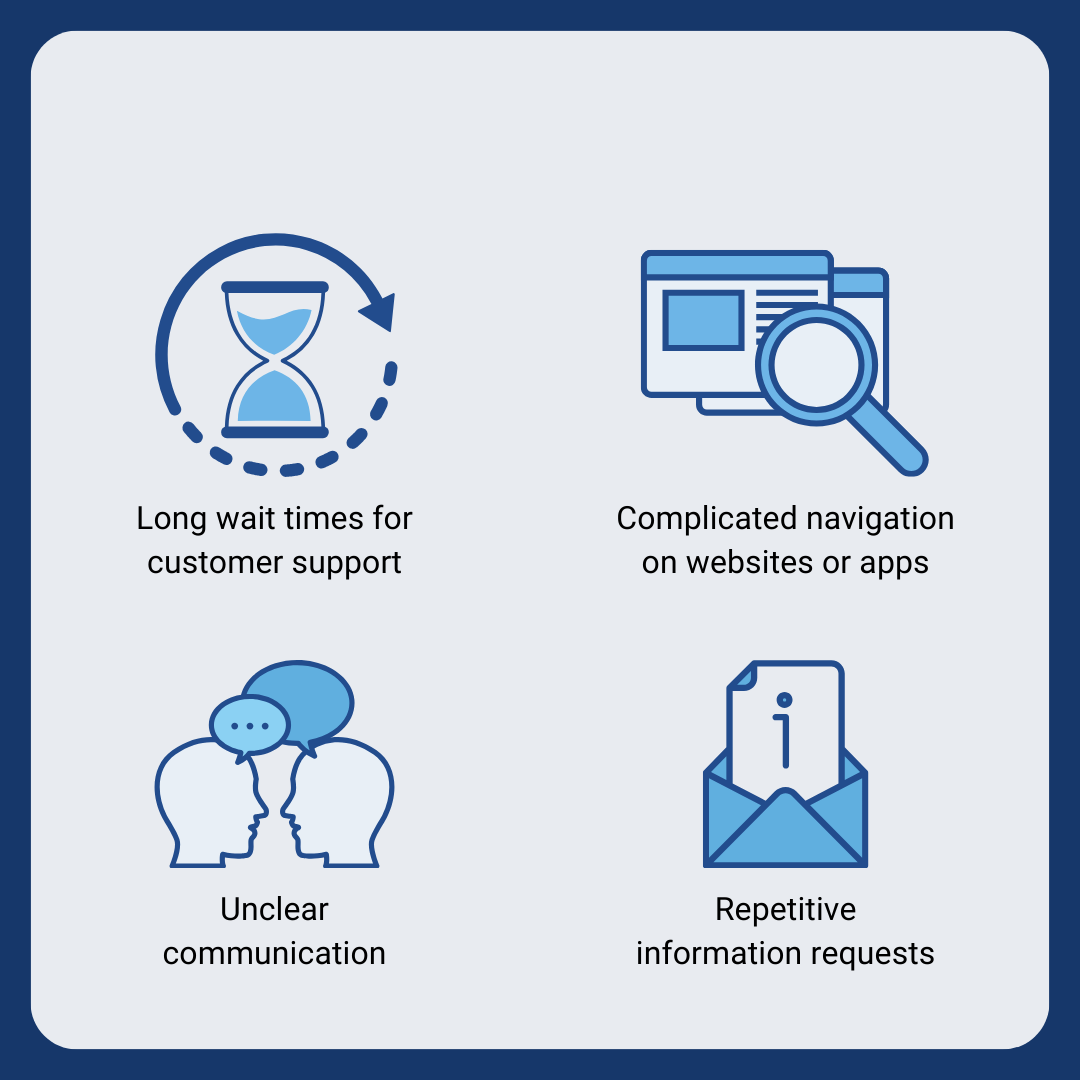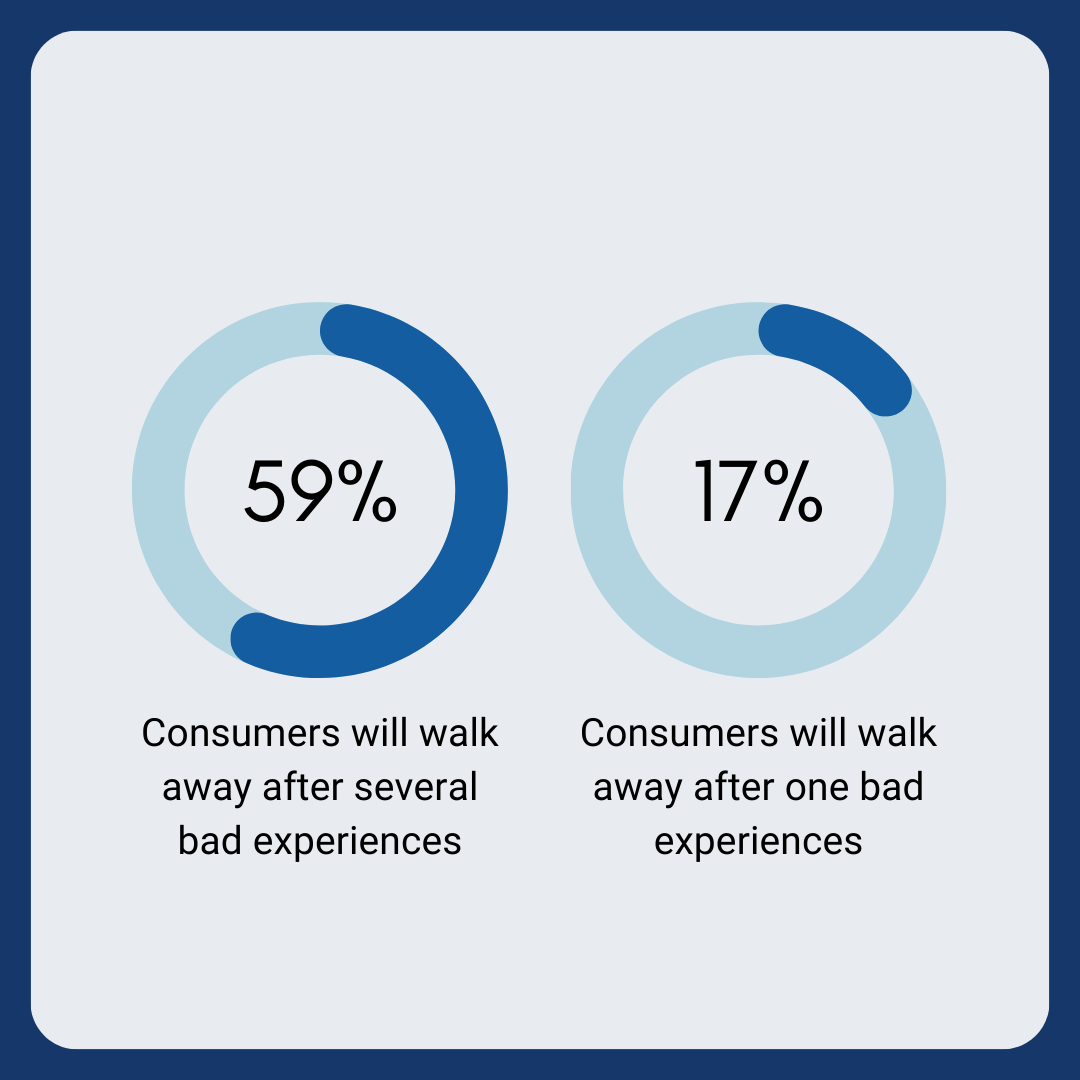What do a smoothly running app, a favorite weekly newsletter, and a timely package delivery have in common? They all reflect the daily benefits of stellar customer experience that make us loyal fans. For businesses, these moments go beyond just delivering a service; they encompass every touchpoint a customer has with your brand, from the initial discovery to post-purchase support. But what are the implications for companies that fail to invest adequately in CX?
The Impact of Customer Experience
How do you quantify the impact of a good customer experience? The secret to a profitable, successful business lies in creating positive customer interactions that weave seamlessly into every aspect of your operations. A compelling customer experience starts the moment someone discovers your brand and continues through every subsequent interaction. This journey can include browsing your website, making purchases, and interacting with customer support. An excellent CX strategy doesn't just satisfy customers; it significantly boosts loyalty, enhances brand reputation, and reduces support costs.
For instance, just a 10% increase in customer retention could yield a staggering 30% increase in company value. This correlation suggests that any attention a business puts into improving its customer experience is an extraordinary return on investment. Satisfied customers display loyalty, repurchase options, and higher willingness to Pay when they expect higher quality service or better customer experience.
Neglecting Customer Experience
What happens when CX is not up to par?

Common friction points such as long wait times for customer support, and complicated navigation on digital platforms can deter users from finding what they need quickly, unclear communication and repetitive information requests during support interactions can lead to customer dissatisfaction and chase customers away, faster than you would think.

Consider this alarming statistic: In the United States, 59% of the customers will stop purchasing from a brand they ‘love’ after a few bad experiences, with 17% claiming they would stop just after a single negative experience with that brand. In a span, up to 49% of customers in places like Latin America would never interact with a brand after a single poor experience.
Letting such experiences go without correction will cause a massive loss of customer base, a decrease in the level of customer retention, and an increase in customer acquisition costs. Every bad experience serves to tarnish the reputation of a brand and harm the profitability of the business.
Here are the risks and costs associated with neglecting customer experience investments:
- Reduced Market Share: In competitive industries, customers often have multiple options to choose from. If a business fails to deliver a satisfactory customer experience, it risks losing market share to competitors who prioritize and deliver superior CX. This shift can be gradual, as dissatisfaction spreads through word of mouth or rapidly if competitors launch targeted campaigns to capture dissatisfied customers.
- Increased Employee Turnover: The link between customer experience and employee satisfaction is often overlooked. Employees who are constantly faced with dissatisfied customers and lack the tools or authority to effectively resolve issues are more likely to experience job dissatisfaction and burnout, leading to higher turnover rates. This not only increases recruitment and training costs but also impacts the consistency of the customer experience.
- Damage to Brand Equity: Brand equity is built on customer trust and positive brand associations. Negative customer experiences can erode these foundations, leading to a long-term decrease in brand value. Repairing brand equity once it has been damaged is often a costly and time-consuming process that requires significant investment in marketing and customer engagement strategies.
- Regulatory Risks: In such regulated industries as finance and healthcare, poor customer experiences can lead to non-compliance with customer service standards set by regulatory bodies. This results in penalties, fines, and in extreme cases, the revocation of much-coveted licenses, all with grave financial and operational repercussions.
Given the very nature of risky businesses, businesses have been helped to learn well why they should invest good money on customer experience initiatives that would improve retention while simultaneously ensuring sustainable business growth.
How Valuebound Champions Exceptional Customer Experience
Valuebound actively addresses the risks associated with neglecting customer experience investments through several key strategies:
- Customer-Centric Solutions: By placing empathy at the core of its values, Valuebound tailors its solutions to meet the unique needs and expectations of each client. This approach helps prevent dissatisfaction and enhances customer loyalty, which directly contributes to maintaining and increasing market share.
- Empowering Employees: Valuebound fosters a culture of continuous learning and integrity, empowering employees with the necessary tools, knowledge, and authority to effectively address customer issues. This not only enhances the customer experience but also increases employee satisfaction and retention by ensuring that staff members feel competent and valued in their roles.
- Improving Brand Equity: Through its commitment to customer delight and exceeding expectations, Valuebound actively works to strengthen its brand equity. By consistently delivering exceptional value and maintaining ethical conduct in all interactions, the company builds and sustains trust with its clients, reinforcing positive brand associations and long-term loyalty.
- Regulatory Compliance: Valuebound's commitment to integrity ensures that all its operations and customer interactions are transparent and comply with relevant industry standards and regulations. This proactive approach minimizes the risk of regulatory penalties and maintains the company’s reputation as a reliable and ethical service provider.
- Transparency: Valuebound's communication strategies, such as providing timely updates and maintaining open lines of communication through weekly reports and monthly demos, ensure that clients are consistently engaged and informed. This not only enhances the customer experience but also allows Valuebound to gather valuable feedback and insights directly from clients, which can be used to refine and improve services.
- Equal Treatment for All Clients: By treating every client with the same high level of service and attention, regardless of budget size, Valuebound avoids the pitfalls of elitism that can alienate smaller clients and lead to negative word of mouth. This inclusivity helps to maintain a positive customer experience across all client engagements.
Through these measures, Valuebound effectively mitigates the risks associated with neglecting customer experience and ensures that it remains a competitive and respected player in its industry, continually enhancing its offerings to meet and exceed customer expectations.
Way Ahead
Failing to invest in customer experience can lead to severe repercussions for your brand's reputation and your financial outcomes.
At Valuebound, we are committed to setting the standard for exceptional customer experiences. If you're ready to elevate your business through strategic CX enhancements, reach out to us today. Don't wait until negative experiences drive your customers away. Partner with us to create a roadmap for CX excellence that aligns with your business objectives and drives sustained growth.
Contact Valuebound today to transform your customer experience and safeguard your brand’s future.
FAQs
1. What is customer experience (CX)?
Customer experience encompasses every interaction a customer has with a business, from the first point of contact through purchasing and post-purchase support. It plays a critical role in customer satisfaction and loyalty.
2. Why is investing in customer experience important for businesses?
Investing in customer experience is crucial because it directly influences customer loyalty, brand reputation, and the overall bottom line. Positive experiences can lead to increased customer retention and the ability to command a price premium for superior service.
3. What are common risks of neglecting customer experience?
Neglecting customer experience can lead to increased customer churn, reduced market share, damage to brand equity, higher employee turnover, and potential regulatory penalties, especially in compliance-driven industries.
4. How does Valuebound enhance customer experience?
Valuebound enhances customer experience by empathizing with client needs, exceeding expectations, maintaining high integrity, and fostering continuous learning. This approach ensures effective problem-solving and promotes a positive, enduring customer relationship.
5. Can poor customer experience affect employee turnover?
Yes, poor customer experience can lead to higher employee turnover. Employees dealing with dissatisfied customers without adequate support or authority to resolve issues may experience job dissatisfaction and burnout, leading to higher turnover rates.





